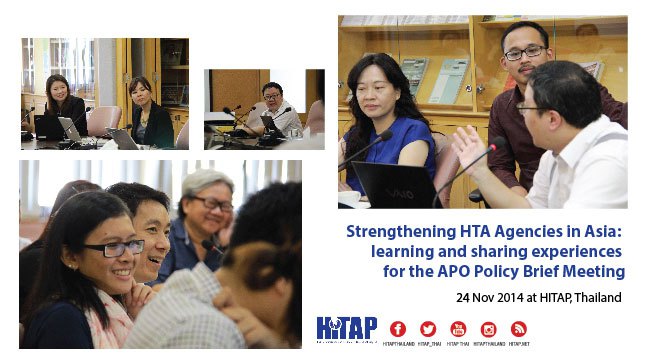Overcoming Barriers: Financing and Service Delivery for Vaccination in Fragile and Conflict-Affected States


With the introduction of the Universal Health Coverage (UHC) in Asian countries, priority-setting and HTA has become increasingly important. However, only in the past decade has HTA been used to inform countries’ health programs and policies. As such, HTA agencies are relatively new in Asia. In 2007, the Health Intervention and Technology Assessment Program (HITAP) was established in Thailand. Consecutively in 2008, a HTA division was established in Taiwan’s Center for Drug Evaluation (CDE) and the National Evidence-based healthcare Collaborating Agency (NECA) was founded in Korea.
CDE, HITAP, and NECA started to make concrete collaborations soon after. The establishment of the HTAsiaLink in 2010 by these three organizations contributed to the subsequent release of the HTAsiaLink quarterly publication. An annual HTAsiaLink conference was established with the aim of building capacity of junior staff and allowing them to build networks in the HTA field, alongside other joint activities.
These efforts garnered more international attention, such as the support and collaboration with the Asia Pacific Observatory on Health Systems and Policies (APO), an organization that promotes evidence-based health policy-making in Asia.
Co-hosted by HITAP and the APO, a meeting between representatives of formal and informal HTA agencies was conducted at HITAP’s offices on November 24-25, 2014. Participating countries were China, Indonesia, Korea, Malaysia, the Philippines, Taiwan, Thailand, and Vietnam. The participants discussed in depth the history of HTA development in their countries, the characteristics of the country’s HTA researches and/or HTA agency, and the barriers as well as conducive factors to establishing an HTA agency.
Several key findings emerged from the discussions. In terms of potential interventions assessed, majority of the agencies included assessments on drugs, medical devices, and public health interventions, while only half included pricing recommendations. Generally, characteristics of functioning HTA agencies are: having a significant proportion of population covered by government health plans; having a national health agency(ies) with full time staff dedicated to HTA; and finally, having a direct link with decision makers and consequently the decision-making process (though this is most effective if legislation supports the HTA system).
Factors conducive to establishment of HTA includes political will and legislation, health system infrastructures such as hospital database, strong domestic networking and engagement of stakeholders, and support from regional and international external partners. Major barriers are over-reliance on expert opinions and deference to senior staff/physicians/the specific medical field’s experts instead of evidence-based decision making (which is perhaps a more characteristic of cultures in Asia), as well as HTA and HTA agencies’ dissociation from the government’s decision making process.
The policy brief meeting’s two outputs are expected to have a significant impact for HTA regionally and globally. First, it aims to strengthen the HTAsiaLink network and individual agencies as well as promote the establishment of formal HTA country agencies. Information from this meeting will be used for the APO’s Heath Systems in Transition (HiT) policy brief report for HTA. Countries that foresee more HTA work in the future may also use the lessons learned in other countries to formalize their own agencies and policies. Second, the policy brief will be launched at the Prince Mahidol Award Conference (PMAC) in 2016. Strengthening country HTA agencies will come under international attention as this conference brings together leading public health leaders and stakeholders from around the world to discuss high priority global health issues, summarize findings, and propose concrete solutions.
A second meeting is set to be conducted in the end of January 2015, to coincide with the Prince Mahidol Award Conference (PMAC) 2015 in Bangkok, to finalize the report and discuss the next steps to establishing successfully functioning HTA agencies in the whole of Asia.